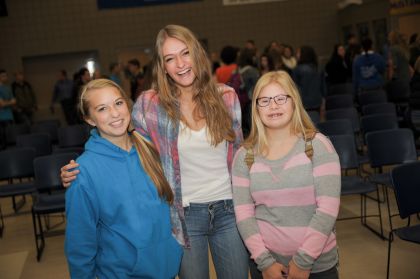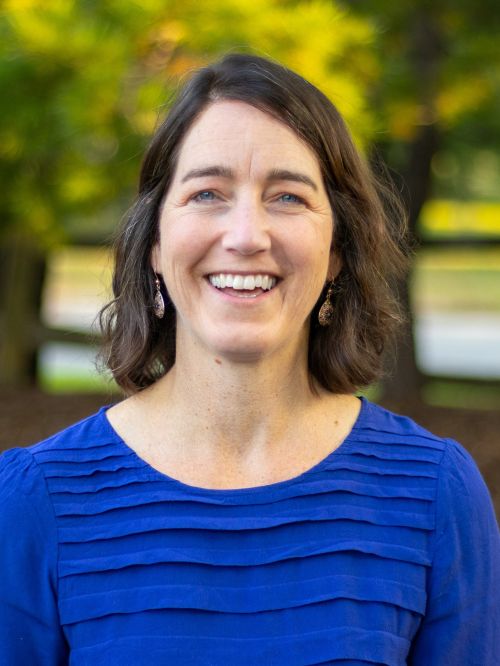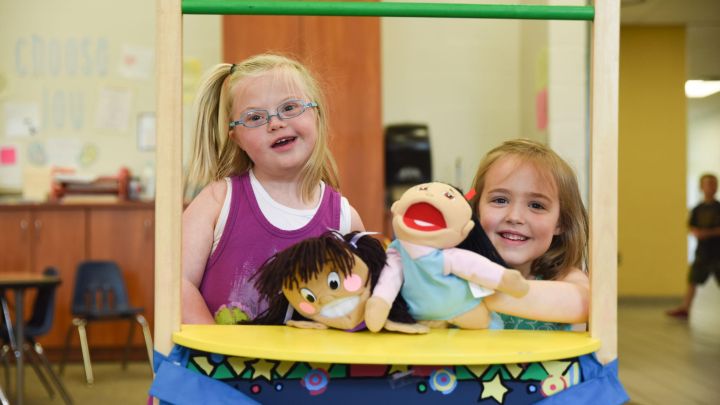You've Got a Friend in Me
Who is your best friend? Who is the friend you call when you need wardrobe advice? How about when you are having a really bad day? What about planning that party or helping with the leaky faucet? Which friend is a quick call away?
True friendships are these magical spaces where you experience being known, accepted, cared for, and loved. All of us need friendships—all of us. They are not a special need for some.
As Christians, we recognize that friendship is a part of God’s design for us to function as one body with many parts. In the Bible, we read of Moses needing Aaron, the inseparability of Paul and Barnabas, and Jesus entrusting his mother’s care to his friend, John.
At All Belong we understand inclusive schools to have two essential markers—ownership and friendship. “Full inclusion on any level comes only when all people have a collection of ordinary friends.” (R. Perske, 1988) No two friendships are alike, and yet they all have one essential ingredient—they are mutual.
While friendship is not a special need for anyone, it may need to be intentionally fostered for some students. Often, the support network for students with disabilities is limited to relatives, specialists, or other disabled peers. As schools of belonging, we recognize the need for all to be “befriended” (Dr. Erik Carter, 2019) and intentionally build that area of belonging.
One tool that inclusive schools have found to be very effective in supporting friendships and the social inclusion of students with disabilities is called a “Circle of Friends.”
Professionals cannot program friendships, but they can get people to the place where friendships can happen.
- R. Perske, 1988

What is a Circle of Friends?
It is a network of student volunteers who make a commitment (length of commitment varies, but is typically for at least one year) to surround and support a student with a disability or complex needs. The number of peers in a Circle of Friends depends on the age and needs of the student as well as the student’s input and preferences; careful consideration and prayer should be given to the composition of the Circle of Friends members.
How does a Circle of Friends work?
In a Circle of Friends, adults help facilitate peer friendships with the goal of creating mutual, authentic friendships over time and through shared experiences. Circle of Friends meetings are generally held 1-2 times per month and follow a similar format.
What is the Circle of Friends Format?
A typical meeting follows this outline.
- Positive Input and Celebrations
- What’s happening in __ grade?
- Proactive/Responsive Problem Solving
- Activity or Topic for Discussion
What are some potential outcomes of a Circle of Friends?
A Circle of Friends has wide ranging areas of impact depending on the students involved. In the short term, Circles have been known to help students learn more socially acceptable behaviors, participate more in class, learn a new concept or motor skill, start a new hobby or keep themselves safe. In the long term, Circles have been known to lead to friendships that last into adulthood. The stories of impact from a Circle of Friends are really endless.
At All Belong we are working toward the vision of every student being known, needed and experiencing belonging in their Christ-centered school and that definitely includes each student having friends. We want each of them to be able to sing the words of Randy Newman’s song from the movie, Toy Story.
You've got a friend in me
You've got a friend in me
When the road looks rough ahead
And you're miles and miles
From your nice warm bed
You just remember what your old pal said
Boy, you've got a friend in me
Yeah, you've got a friend in me
You've got a friend in me
You've got a friend in me
If you've got troubles, I've got 'em too
There isn't anything I wouldn't do for you
We stick together and can see it through
Cause you've got a friend in me
You've got a friend in me
Some other folks might be
A little bit smarter than I am
Bigger and stronger too Maybe
But none of them will ever love you
The way I do, it's me and you
Boy, and as the years go by
Our friendship will never die
You're gonna see it's our destiny
You've got a friend in me
You've got a friend in me
You've got a friend in me
References
- Perske, R. (1988). Circle of Friends. Welch Publishing Company Inc.
- Carter, Erik W. (2019) Ten Dimensions of Belonging. Vanderbilt Kennedy Center.

Marji Voetberg
Teacher Consultant and Educational Resources Manager
Marji Voetberg, a Teacher Consultant and Educational Resources Manager at All Belong, has spent over 25 years working in Christian inclusive education environments. Marji's passion for the beauty and benefits of an inclusive environment for all God's children has only increased throughout these years. When not at work, Marji can be found hiking, biking, walking, or cheering her kids on at their events.
